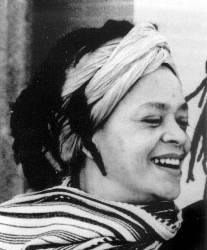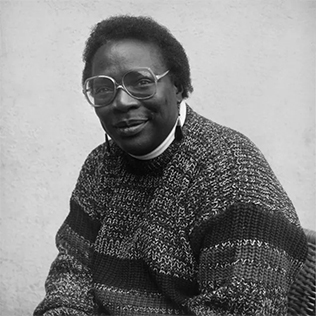Related Research Articles
Radical feminism is a perspective within feminism that calls for a radical reordering of society in which male supremacy is eliminated in all social and economic contexts, while recognizing that women's experiences are also affected by other social divisions such as in race, class, and sexual orientation. The ideology and movement emerged in the 1960s.

Audre Lorde was an American writer, feminist, womanist, librarian, and civil rights activist. She was a self-described "black, lesbian, mother, warrior, poet," who "dedicated both her life and her creative talent to confronting and addressing injustices of racism, sexism, classism, and homophobia."

Toni Cade Bambara, born Miltona Mirkin Cade, was an African-American author, documentary film-maker, social activist and college professor.
John Stoltenberg is an American radical feminist activist, author, and magazine editor. He is the former managing editor of AARP The Magazine, a bimonthly publication of the United States-based advocacy group AARP, a position he held from 2004 until 2012. He was born and raised in California, United States.

Lesbian feminism is a cultural movement and critical perspective that encourages women to focus their efforts, attentions, relationships, and activities towards their fellow women rather than men, and often advocates lesbianism as the logical result of feminism. Lesbian feminism was most influential in the 1970s and early 1980s, primarily in North America and Western Europe, and arose out of dissatisfaction with the New Left and the Campaign for Homosexual Equality.

Transfeminism, also written trans feminism, has been defined by scholar and activist Emi Koyama as "a movement by and for trans women who view their liberation to be intrinsically linked to the liberation of all women and beyond." Koyama notes that it "is also open to other queers, intersex people, trans men, non-trans women, non-trans men and others who are sympathetic toward needs of trans women and consider their alliance with trans women to be essential for their own liberation." Transfeminism has also been defined more generally as "an approach to feminism that is informed by trans politics."

I Know Why the Caged Bird Sings is a 1969 autobiography describing the early years of American writer and poet Maya Angelou. The first in a seven-volume series, it is a coming-of-age story that illustrates how strength of character and a love of literature can help overcome racism and trauma. The book begins when three-year-old Maya and her older brother are sent to Stamps, Arkansas, to live with their grandmother and ends when Maya becomes a mother at the age of 16. In the course of Caged Bird, Maya transforms from a victim of racism with an inferiority complex into a self-possessed, dignified young woman capable of responding to prejudice.

Intersectionality is an analytical framework for understanding how aspects of a person's social and political identities combine to create different modes of discrimination and privilege. The term was conceptualized and coined by Kimberlé Williams Crenshaw in a paper in 1989. Intersectionality identifies multiple factors of advantage and disadvantage. Examples of these factors include gender, caste, sex, race, class, sexuality, religion, disability, physical appearance, and height. These intersecting and overlapping social identities may be both empowering and oppressing. For example, a black woman might face discrimination from a business that is not distinctly due to her race nor distinctly due to her gender, but due to a combination of the two factors.
Diana E. H. Russell was a feminist writer and activist. Born and raised in Cape Town, South Africa, she moved to England in 1957, and then to the United States in 1961. For the past 45 years she was engaged in research on sexual violence against women and girls. She wrote numerous books and articles on rape, including marital rape, femicide, incest, misogynist murders of women, and pornography. For The Secret Trauma, she was co-recipient of the 1986 C. Wright Mills Award. She was also the recipient of the 2001 Humanist Heroine Award from the American Humanist Association. She was also an organizer of the First International Tribunal on Crimes against Women, in Brussels in March 1976.

Barbara Smith is an American lesbian feminist and socialist who has played a significant role in Black feminism in the United States. Since the early 1970s, she has been active as a scholar, activist, critic, lecturer, author, and publisher of Black feminist thought. She has also taught at numerous colleges and universities for 25 years. Smith's essays, reviews, articles, short stories and literary criticism have appeared in a range of publications, including The New York Times Book Review, The Black Scholar, Ms., Gay Community News, The Guardian, The Village Voice, Conditions and The Nation. She has a twin sister, Beverly Smith, who is also a lesbian feminist activist and writer.
Chicana feminism is a sociopolitical movement in the United States that analyzes the historical, cultural, spiritual, educational, and economic intersections of women that identify as Chicana. Chicana feminism empowers women and insist that they challenge the stereotypes and boundaries that Chicanas face across lines of gender, ethnicity, race, class, and sexuality. Most importantly, Chicana feminism is a movement. It is also a theory and praxis that helps women reclaim their existence between and among the Chicano Movement and American feminist movements.
Elana Dykewomon is a lesbian activist, author, editor and teacher. She is a recipient of the Lambda Literary Award for Lesbian Fiction.
Beverly Smith in Cleveland, Ohio, is a Black feminist health advocate, writer, academic, theorist and activist who is also the twin sister of writer, publisher, activist and academic Barbara Smith. Beverly Smith is an instructor of Women's Health at the University of Massachusetts Boston. In her writings, Beverly notes that religion and education "were twin pillars" in her home as she grew up.

This Bridge Called My Back: Writings by Radical Women of Color is a feminist anthology edited by Cherríe Moraga and Gloria E. Anzaldúa. First published in 1981 by Persephone Press. The second edition was published in 1983 by Kitchen Table: Women of Color Press. The book's third edition was published by Third Woman Press until 2008, when it went out of print. In 2015, the fourth edition was published by State University of New York Press, Albany.

Pat Parker was an American poet and activist. Both her poetry and her activism drew from her experiences as an African-American lesbian feminist. Her poetry spoke about her tough childhood growing up in poverty, dealing with sexual assault, and the murder of a sister. At eighteen, Parker was in an abusive relationship and had a miscarriage after being pushed down a flight of stairs. After two divorces she came out as lesbian “embracing her sexuality” she was liberated and “knew no limits when it came to expressing the innermost parts of herself”. Parker participated in political activism and had early involvement with the Black Panther Party, Black Women's Revolutionary Council and formed the Women's Press Collective. She participated in many forms of activism especially regarding gay and lesbian communities, domestic violence, and rights of people of color. She released five poetry collections: Child of Myself (1972), Pit Stop (1975), Movement in Black (1978), Woman Slaughter (1978), and Jonestown and Other Madness (1985).
Florence Rush was an American certified social worker, feminist theorist and organizer best known for introducing The Freudian Coverup in her presentation "The Sexual Abuse of Children: A Feminist Point of View", about childhood sexual abuse and incest, at the April 1971 New York Radical Feminists (NYRF) Rape Conference. Rush's paper at the time was the first challenge to Freudian theories of children as the seducers of adults rather than the victims of adults' sexual/power exploitation.

Andrea Rita Dworkin was an American radical feminist activist and writer. She is best known for her analysis of pornography, although her feminist writings, beginning in 1974, span 40 years. They are found in a dozen solo works: nine books of non-fiction, two novels, and a collection of short stories. Another three volumes were co-written or co-edited with US Constitutional law professor and feminist activist, Catharine A. MacKinnon.
Feminism has affected culture in many ways, and has famously been theorized in relation to culture by Angela McRobbie, Laura Mulvey and others. Timothy Laurie and Jessica Kean have argued that "one of [feminism's] most important innovations has been to seriously examine the ways women receive popular culture, given that so much pop culture is made by and for men." This is reflected in a variety of forms, including literature, music, film and other screen cultures.
Queer of color critique is an intersectional framework, grounded in Black feminism, that challenges the single-issue approach to queer theory by analyzing how power dynamics associated race, class, gender expression, sexuality, ability, culture and nationality influence the lived experiences of individuals and groups that hold one or more of these identities. Incorporating the scholarship and writings of Audre Lorde, Gloria Anzaldua, Kimberle Crenshaw, Barbara Smith, Cathy Cohen, Brittney Cooper and Charlene A. Carruthers, the queer of color critique asks: what is queer about queer theory if we are analyzing sexuality as if it is removed from other identities? The queer of color critique expands queer politics and challenges queer activists to move out of a "single oppression framework" and incorporate the work and perspectives of differently marginalized identities into their politics, practices and organizations. The Combahee River Collective Statement clearly articulates the intersecting forces of power: "The most general statement of our politics at the present time would be that we are actively committed to struggling against racial, sexual, heterosexual, and class oppression, and see as our particular task the development of integrated analysis and practice based upon the fact that major systems of oppression are interlocking. The synthesis of these oppressions creates the conditions of our lives." Queer of color critique demands that an intersectional lens be applied queer politics and illustrates the limitations and contradictions of queer theory without it. Exercised by activists, organizers, intellectuals, care workers and community members alike, the queer of color critique imagines and builds a world in which all people can thrive as their most authentic selves- without sacrificing any part of their identity.
"Becoming Visible: The First Black Lesbian Conference" was held at The Women's Building in San Francisco, California, from October 17 to 19, 1980. It has been credited as the first conference for African-American lesbian women.
References
- 1 2 Moraga, Cherríe; Anzaldúa, Gloria, eds. (2015). This Bridge Called My Back, Fourth Edition: Writings by Radical Women of Color. State University of New York Press. pp. 232–238, 268. ISBN 978-1438454382. OCLC 894128432.
- 1 2 3 4 Crawford, Anna Elaine Brown (January 1, 2002). Hope in the Holler: A Womanist Theology. Westminster John Knox Press. pp. 79, 85. ISBN 9780664222543.
- ↑ "About". Black Magnolias. April 11, 2015. Archived from the original on November 7, 2017. Retrieved November 1, 2017.
- ↑ Quashie, Kevin Everod (2004). Black Women, Identity, and Cultural Theory: (un)becoming the Subject . Rutgers University Press. pp. 17–18. ISBN 9780813533674.
andrea r canaan black women identity.
- ↑ Bell, Linda A. (2012). Beyond the Margins: Reflections of a Feminist Philosopher. SUNY Press. p. 102. ISBN 9780791486016.
- ↑ Berger, Michele Tracy; Guidroz, Kathleen (January 1, 2010). The Intersectional Approach: Transforming the Academy through Race, Class, and Gender. Univ of North Carolina Press. p. 83. ISBN 9780807895566.
- ↑ Faulkner, Mara (1993). Protest and Possibility in the Writing of Tillie Olsen . University of Virginia Press. pp. 106. ISBN 9780813914176.
Andrea Canaan.